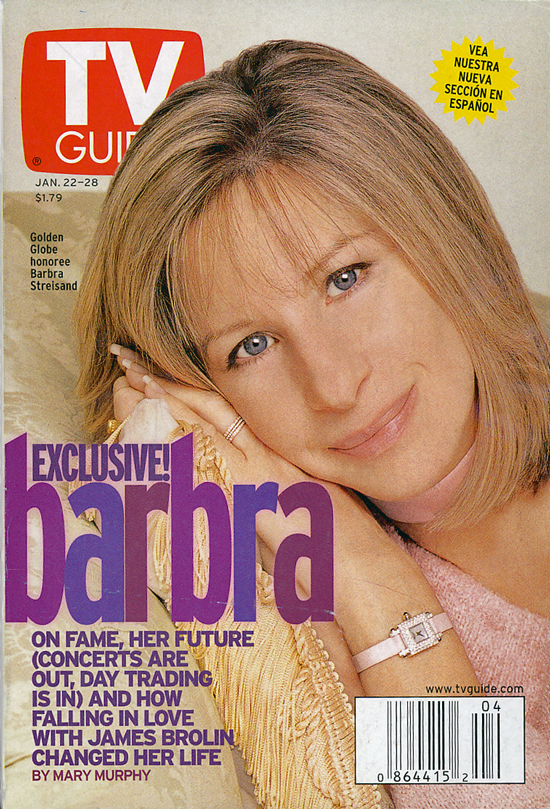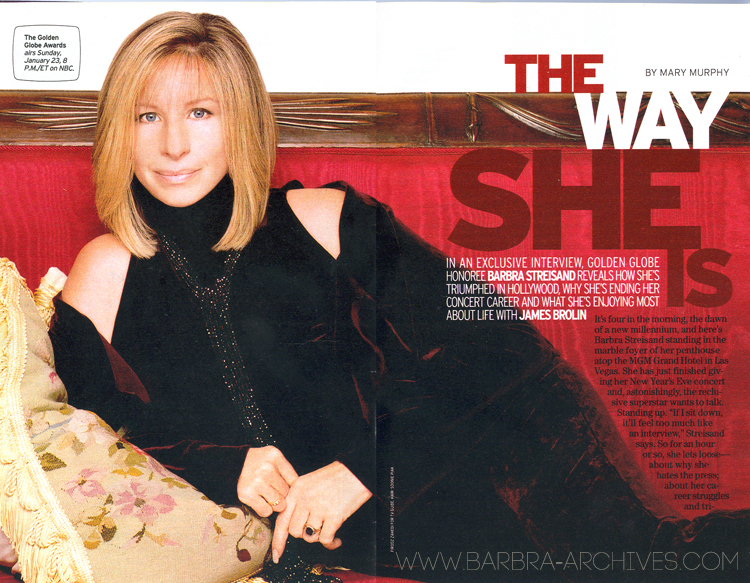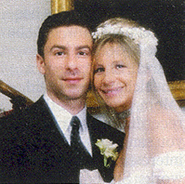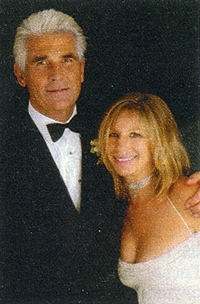
TV Guide
Jan. 22—28, 2000
The Way She Is
by Mary Murphy
Cover Photo: Firooz Zahedi for TV Guide; Hair: Soonie Piak.
It's four in the morning, the dawn of a new millennium, and here's Barbra Streisand standing in the marble foyer of her penthouse atop the MGM Grand Hotel in Las Vegas. She has just finished giving her New Year's Eve concert and, astonishingly, the reclusive superstar wants to talk. Standing up. “If I sit down, it'll feel too much like an interview,” Streisand says. So for an hour or so, she lets loose— about why she hates the press; about her career struggles and triumphs; about her family life and how she unexpectedly fell in love with actor James Brolin, her second husband. A staunch supporter of President Clinton and a lifelong Democrat, Streisand even talks about the rumor that she was banned from the White House by Hillary Clinton. And she reveals why she intends these concerts to be her last, ever, in the United States.
Barbra Streisand is a legend who, for more than 40 years, has done it all — singing, acting, producing and directing. She has sold 80 million records and won all the entertainment industry's top awards: Oscar, Tony, Emmy, Grammy, Peabody and Golden Globe. On January 23, she will be honored again by the Hollywood Foreign Press, this time with its Cecil B. DeMille award for outstanding contributions to the entertainment field (see TV GUIDE listings for a complete fist of nominees).
Onstage tonight Streisand was commanding, larger than life, her golden voice lifting her to another dimension. In person she is diminutive and soft-spoken. When you meet Brolin, what immediately strikes you is how physically powerful he is by comparison. He towers over her, and his deep, booming voice nearly drowns hers out.
"He has an incredible ability for relaxing, just accepting what is," says Margery Tabankin, executive director of the Streisand Foundation, which has donated grants totaling $14 million to various causes, including women's issues and AIDS research. "Barbra has always been a perfectionist. He brings calm and quiet to her heat and energy. He'll just drive for hours and find a hotel, where they don't even have a reservation, and pull in. It's incredible. It's just so un-Barbra."
And that's the point. At 57, Barbra Streisand has found a happiness that is reflected in this concert, on her recent albums and throughout her life. She'll never surrender her insistence on quality, but Streisand is clearly at the point where she's willing to expose her most tender feelings and let her private life assume more importance than her stardom.

TV GUIDE: Is this really it? Are these really your last American concerts?
Barbra Streisand: This is the last time I'm going to do any kind of concert. I said to my husband, "I don't like performing; I feel like I'm in a beauty pageant, like I'm 18 and strutting round the stage." I'm very shy. Ironically, tonight is the most relaxed I've ever been. I usually get sick to my stomach before I go on.
TVG: Why were you so relaxed?
BS: Because my priorities are different now. I don't have to be perfect. I was looking at an article written about me when I was 29, and it quotes me as saying, "I want to be the best at everything." That was my goal. [Now] I'd like to be the best person, wife and mother. I don't have to be anything but what I am, you know?
TVG: Where did your need for perfection come from?
BS: It was the only way I was accepted as a kid. I could sing, [so] people liked me. If I didn't have a talent, they didn't have to like me.
TVG: What made you so determined to do what you wanted in Hollywood?
BS: Because I have these dreams, these images, these visions. I have this passion for it, and it is very hard to find something you feel passionate about. And it is wonderful to have something that inspires you and drives you. [Hollywood] can't put together the idea that a woman can be an actress-singer, which is supposedly a flighty thing, combined with being fiscally responsible [and having] a business sense. And to do all that is worth the fight.
TVG: Many women at the concert told me that you are their role model.

BS: What I've done, going into a man's world, was tough. You get attacked, but mostly by women. That's the irony. I've found that women are the most competitive and vitriolic [people]. The worst reviews I've gotten were from women. Very superficial criticism. For instance, "Yentl." Here I thought I was giving something to women, saying, "Look how powerful and nurturing we are. " The next day The New York Times criticized the yarmulkes, calling them "designer yarmulkes. " Everything I did in the movie had historical reality. But when they are out to get you, they are out to get you.
TVG: How do you get over it?
BS: Well, I don't, but I don't want to work that much anyway.
TVG: Then they win.
BS: That's partly true. But I'm not that ambitious anymore. I just like my privacy. I wish I really wasn't talked about at all.
TVG: You don't do the Hollywood party circuit.
BS: I never go anywhere where there are cameras, except when my husband got a star on Hollywood Boulevard in 1998. I had to go to support him. When I got my own star [after "Funny Girl"], I never went to get the plaque or whatever they give you. I thought it was weird. But when I went with Jim, they gave me the plaque—30 years later.
TVG: You keep a low profile, but onstage your singing is so emotional, and you share so much of your personal life.
BS: I'm exposing myself to my fans, to people who love me. Who's going to pay this kind of money who doesn't love me?
TVG: During your act you mentioned playing the stock market.
BS: I did. I'm up 191 points.
TVG: Did you trade today? What did you buy?
BS: I didn't buy. I sold some Time Warner, held my Qualcomm—the stock of the year. I trade from feeling. I resent the work [in show business]. It takes up time from playing the market. My rehearsals [never] start until 3 PM, after the market closes (laughs].
TVG: Most stars know instinctively what's best for them. You had that instinct early on. Where do you think it came from?
BS: I don't know. My mother, Diana, has a beautiful voice. She has Alzheimer's now, but she came to see me in rehearsal. She came in a wheelchair. And I said, "Mom, remember that, recording session [when] you sang 'One Kiss'?" It's interesting how the mind works: She could not remember what she had for lunch that day, but she remembers a song she recorded in 1955. So we sang "One Kiss."
TVG: It must be difficult to see your mother suffering from Alzheimer's.
BS: It's not pleasant. On the other hand, she's much happier. She forgot to be angry. She seems calmer and more loving. So there's a curse and there's a blessing. My mother flies now. I used to want to send her all over the world, [but] she would never get on a plane. And now she gets on a plane. She forgot to be afraid to fly.
TVG: You're being honored at the Golden Globe Awards for your career achievements. In 1962, you made your Broadway debut in "I Can Get It for You Wholesale," for which you received a Tony nomination.

BS: By the way, I never remember the awards I win. But what I do remember is that that show was the beginning of my directing career. At my audition, I asked to sit in a chair because I was nervous and because I thought it was an interesting concept. They wouldn't let me do it. But the number wasn't working, so before opening night they finally said—the director said— "Do it in your goddamn chair." And it stopped the show. They doubled my weekly salary to $400, and that's how I started.
TVG: When you made "Funny Girl," did people say you would never make it as a movie star?
BS: They said I wasn't pretty enough. I wasn't conventional-looking certainly, but I had the great fortune of working with [director] William Wyler and [cinematographer] Harry Stradling, who both loved me and liked my looks.
TVG: What was the significance of that film?
BS: I could learn from Wyler, and yet I knew what I was doing because I had played the role on stage a thousand times [on Broadway]. So it was a fantastic collaboration and Harry Stradling was the greatest. The press said we were having fights—absolutely untrue. Maybe I had opinions that were not de rigueur in those days. The great stars of the '30s and '40s, like Marlene Dietrich, a had opinions; and then the whole image of women in film changed in the'50s, and they became less vocal. Maybe they were not used to someone who was a throwback to the '40s. So when I read these things, I was so hurt by the lack of truth. And that's when I started to hate the press.
TVG: What about now? Here in Las Vegas there are reports that you won't allow employees at the MGM Grand to make eye contact with you.
BS: Do you believe this crap? We started a "truth alert" on my Web site because of silly stories like these. I can't even discuss it, it's so stupid. People talk about how I walk into a room, and if a guy plays a wrong note, he's fired. They're making me into some diva, and I'm like this normal person. I mean, do you think I'm some soft of crazy diva? I do my own makeup. My hairdresser's been with me for 20 years. I don't know why it is that we need to denigrate, to knock down. It's so unhealthy for the culture. It's so sick.
TVG: What about all the negative publicity you received when you auctioned your furniture? [The Craftsman Farms Foundation claims they asked Streisand to donate some Gustav Stickley cabinets or arrange a private sale; she sold them at auction.]
BS: I did not want to give to this place because they were coercing me. It was not nice. Nobody has a right to tell me where to give my money.
TVG: I understand you have a medical problem — a constant ringing in your ears?
BS: It's called tinnitus. I've had it since I was 8. I never hear the silence. But I've learned to live with it.
TVG: Who are your friends in Hollywood?
BS: When I tried out the concert in Manhattan Beach [in December 1999], Brenda Vaccaro was there cheering me on. Pierce Brosnan, Mimi Rogers were there, too. The whole Bridges family came. They're all like my new extended family.
TVG: Let's talk about your leading men: Robert Redford in "The Way We Were."
BS: I adored him. We had a great, interesting curiosity about each other that really permeated the piece, because we were so different.
TVG: Nick Nolte in "The Prince of Tides."
BS: Again, a parallel with the characters. It was Nick's trust of me that paralleled the character's growing trust of Dr. Lowenstein.
TVG: Your son, Jason, played your son in the film.
BS: At first I thought he was too old. He was 23, and Dr. Lowenstein's son is supposed to be, I think, 17. I actually hired someone else [Chris O'Donnell], and then Jason called me. He never asks for anything, but he said, "Mom, I would really like to play that part. " And then Pat, Conroy [who wrote the novel on which the film is based] saw his picture on my piano and says, "He looks like [the character of] Bernard. " So I hired Jason and literally paid off O'Donnell.
TVG: How did it go?
BS: Before we made the movie I couldn't even tell him that I didn't like his hair because he would get mad at me. And then I said, "You have to separate me as your mother and as your director. This is an exercise for you, and me too." There were moments where he couldn't handle it. But he was brilliant. He's the only one who got consistently good reviews.
TVG: Jason sat in the front row during the concert, and you sang to him. How do you see yourself as a mother?
BS: As good as can be expected. We all make mistakes, but I'm very proud of my son. He's very thoughtful. He's not flaky; you can depend on him. He's generous, sweet and gifted.
TVG: Turning to the future, who will you support for president this year?
BS: A Democrat. If it is Gore, it's Gore. I like Bradley, too. But Gore is a good guy. You watch and think, "You need [media] lessons." Bradley is much more comfortable. Gore [she shakes her head] — he actually called from Air Force One [for advice]. I couldn't take the call. I was in the middle of something. He's a good politician. Both guys are good.
TVG: You've been loyal to [President] Clinton.
BS: I think he is a great president. He's done wonderful things for people and the economy. The Republicans want to take credit for it. Taking a story [like his affair with Monica Lewinsky] — who cares? What difference does it make what somebody does in the bedroom or the office?
TVG: Is it true that you were banned from the White House by Hillary Clinton after you spent the night there when she was on a trip?
BS: Absolutely not. I am a friend of Hillary's. I don't know if I am going to work for her, but I just gave her money for her campaign. [James Brolin enters the room and stands by Streisand, smiling.]
TVG: Your fans seem thrilled that you finally found love.
BS: They have hope for themselves, that you create your own fate. I was alone a long time. I couldn't find anyone to love or to marry.
TVG: Did you like him the night you met ?
BS: It is very unusual for me to like a date. And I resented the fact that I had to drive to this party to meet him, because it took me away from my work [she was editing "The Mirror Has Two Faces" at the time]. And then I talked to him, and he said, "I will take you home." I called [my editors] up and said, "You can go home." He was interesting enough for me to let him take me home.
TVG: How did it progress?
BS: I saw him again at a party. It was very unpleasant. So I went home and ate a lot of ice cream and said, "I can't deal with this." And my son said to me, "Ma, call him." I did. We went to the movies, and during the evening I said to him, "This is very awkward." We talked very truthfully. Then the next time we went out he brought me a movie to see. And this was a great test, to see if he would bring me one that I'd like. It was a French movie called "The Hairdresser's Husband." [She liked the movie].
TVG: [To Brolin] Were you intimidated by her?
James Brolin: No. I don't think I've ever been intimidated by anybody.
TVG: Not even Barbra Streisand?
JB: I went through a lot of girls over time. All these girls who started in TV and who are now movie stars. I picked all the wrong ones. Somebody else picked [Barbra] for me.
TVG: Who was that?
JB: [Brolin's manager] Jeff Wald and [friend] Christine Peters. [Jeff] knew I wouldn't be afraid of her. Her strength did not bother me. And that was an issue, because I don't want anybody to support me. She is successful, and that means every guy is after her. How do I keep up with this? We had a lot of discussions about this early on and reached an understanding.
BS: At this point in my life, I couldn't pick a man who would be frightened of power or wealth.
TVG: Margery Tabankin said that one of the great things you have done for Barbra is to tell her to celebrate her mistakes, not worry about them.
JB: I'm a director, and if anybody ever says "Cut" because an actor blows a line, they're out. Actors are allowed to fix the dialogue, make it work. Yesterday, when [Barbra's] dress caught in the floorboard [during the rehearsal], she handled it so well. And that is the test for anyone, when you are really under duress. I could never do what she does. I can learn lines and say them back. She was blessed with a great instrument. Anybody can be given a Stradivarius, but it is hard to learn how to play it.
TVG: [To Streisand] I noticed that when you brought your husband up onstage tonight, you looked like you were madly in love and really contented.
BS: That is true. I had this song written that is called "Simple Pleasures." It's based on how we live our life. We relax by driving and going to the movies, having hotdog cookouts and swimming in the pool or sitting out looking at the stars at night.
TVG: How has this relationship changed your life?
BS: It's been great. That's why I can go onstage and be relaxed. It puts you in another role; it's not about being Barbra Streisand.
End.
